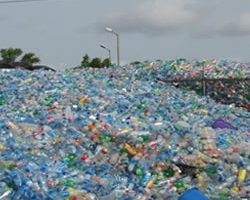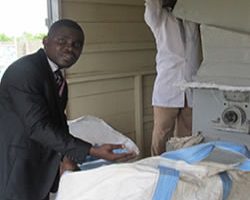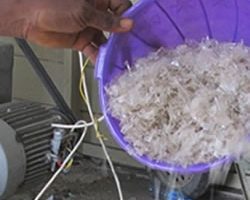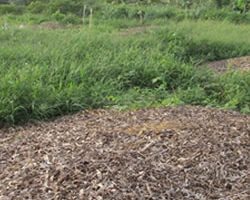The target is to reduce environmental pollution through a sustainable green practice in waste management of all wastes generated in offices, homes, public and open spaces within Covenant University.
Turning our Waste into Wealth thereby generating revenue for the University (IGR).
- To promote excellence in waste management and recycling operations, by enhancing environmental sustainability and sustainable strategies to the University community
- To provide excellence in waste reduction, recycling services and other sustainable campus practices to the University
- To provide students with direct experience in environmental management through environmental stewardship, academic internship, paid positions and volunteer opportunities
- To promote excellence in waste management and recycling operations, by enhancing environmental sustainability and sustainable strategies to the University community
- To provide excellence in waste re
- Environmental Sustainability and Operation Education
- Promoting Excellent Waste Management
- Serve as Income Generation for the University
- Source of Employment.
- It is an Effective Way of Engaging Students in Paid Employment
- Good Social Profit to the University because it will earn her a global recognition in the light of vision 1 of 10 in10.
- duction, recycling services and other sustainable campus practices to the University
- To provide students with direct experience in environmental management through environmental stewardship, academic internship, paid positions and volunteer opportunities
The followings are the projects/areas of research for the cluster.
- Water Sanitation and Hygiene issues (WASH)
- Urban environments and how they function
- Challenges with building defects and development of alternative materials for the industry
- Alleviation of urban stress problems
- Urban drainages and structural defects
- Air, water and soil pollution
- Remediation of polluted sites etc.
Activities (Action Plan 1)
Stage 1. Collection of Paper -, PET bottles-, and Nylon-wastes to be bailed for sale to the buyers.
Stage 2. The institution will setup a vibrant waste management center/ recycling plant to recycle paper and Nylon wastes generated on campus and turn it into useful products such as tissue paper, envelops etc.
Stage 3. Set up a glass/bottle recycling programme which could involve students, faculty in research and staff so as to ensure proper management of the PET bottle and glass wastes.
Stage 4. Extend the programme to Ota community to harness all potential wastes of benefit for the set-up of stages 5&6
Stage 5. Composting of all Organic Waste that will serve as manure for the University Farm
Stage 6. Generation of Biogas from the Organic Waste
Others will follow as the scheme expands
Synopsis on waste to wealth project
The practice of collecting, treating and management of solid waste prior to disposal has become a necessity in developing and modern societies. Over the years, it is known that most wastes that are disposed have a second-hand value. They can be recycled and reused, hence reducing the pressure and consumption of virgin materials. However, the construction cost for conventional Material Recovery Facility(s) (MRFs) has been a major barrier to the implementation of conventional technology to recover wastes by local authorities in Africa, particularly in Nigeria. In addition, these technologies require considerable technical expertise, which is often not available in developing nations to successfully operate the MRFs. The waste to wealth initiative has therefore come up with a plan and affordable technology that is able to convert waste generated in the entire Canaan land into useful products.
The Waste to Wealth Project was inaugurated and commissioned on the 8th of October, 2014 with the focus to managing the three major categories of wastes being generated in Covenant University and Canaan Land. These include Pet bottles, Paper wastes and Food wastes. The focus of each of the waste is to process them to reusable products.
- The pet bottles to be processed to pellet form, which can be used as starting materials for fabrication of new products.
- The Food wastes to be processed into manure for usage in the University farm via composting.
- The paper wastes are for processing to newsprints, tissues and other related products
Companies in Lagos and Ogun States dealing in Pet bottle recycled products (Pet bottle product)
Chinese companies that use the materials to produce Fabrics (Pet bottle Product)
Covenant University Community and Canaan Land (Recycled paper products and food waste turned into Manure)
- Timothy Anake (Head)
- Sheila Bishop
- Michael Agarana
- Alfred Owoloko?
- Oluwole Odetunmibi
- Kelechi Eke
- Olasunmbo Agboola
- Godwin Oghonyon
Mr. Omotayo Adeleke
- Commit to training and mentoring of young researchers at the masters and doctoral degree levels
- Conduct field survey researches that are aimed at evaluating quality of technology adoption, usage, and impact
- Conduct implementation-based research that is aimed at developing useful software tools and solutions in practical areas. This should lead to commercial products, patents and intellectual rights
- Conduct basic research in the thematic areas of interest of the Cluster in order to extend the frontiers of knowledge
- Engage in consultancy and knowledge transfer activities that will culminate in turning research ideas into value-added services and products for the benefit of the larger society.
- Encourage first rate research endeavours that will lead to publications in high impact journals and influential publication outlets
- Create a community of research-active faculty within Covenant University and beyond.
- Facilitate increased university-industry collaboration by engaging in applied research activities.
The SEMIS cluster shall disseminate its research findings through the following channels:
- Annual Conference
- Biannual Journal Publication
- Research blogs and electronic newsletters
- Periodic book reviews, edited books, and book publications
The expertise of the SEMIS Cluster is further strengthened by a thriving network of international scholars and collaborators in different parts of the world. The list of researchers who have active collaborations with the SEMIS Cluster features:
- M. O Adigun, University of Zululand, South Africa
- Michael Adeyeye, CPUT, SA
- A. Ojo, UNU, Macao, China
- O. Longe, Adeleke University
- Prof V. Mbarika, Southern University, USA
- Prof O. Adewunmi, University of Kwazulu-Natal, SA
- Philip Adewoye, University of Lagos
- Prof E.O Ayoola, University of Ibadan
- Prof J. O. Olalero, University of Lagos
Prof J. Gbadeyan, University of Ilorin
The grant profile of SEMIS Cluster so far includes the following:
- Google CS4HS 2012 Award, $7,000 approved
- NCS Don Etiebet Software Innovative Award 2012.
- Covenant University Grant for the Development of an Automatic Speech Recognition for Customer Care Management ASR4CRM) Research: N1.57M Approved 2007
- Covenant University, Seed Grant for the Design and Development of Institutional Repository N0.65m Approved 2010.
There is need to find out if there are updates on the following information highlighted in red
- Development of a Unified Multimodal National Identity Card
- Design and Implementation of a Car Tracking System Simulator: A case study of Covenant University
- Development of an Anti-cultism Social Educational Media (ASEM) System for Nigerian Tertiary Institution: Web and Mobile.
- Development of an e-Opinion Poll System
- Implementing a Social Media-Based e-Learning System for the Developing Nations
- Development of Subject-based Auto grading System – (grant application in preparation)
Budget
| Sub Cluster’s Name | Senior Faculty | Other Faculty | Expected No of Conference Articles | Expected No of Journal Articles |
| MSEC | 5 | 5 | 12 | 6 |
| ISSA | 5 | 9 | 14 | 6 |
| ISBI | 4 | 2 | 6 | 4 |
| MMI | 4 | 4 | 8 | 4 |
| TOTAL | 18 | 20 | 40 | 20 |
GRAND TOTAL OF EXPECTED PUBLICATIONS — 60
Estimated Cost of Publication of 20 Journal articles @ $500 per paper = $10,000
Estimated Cost of implementing Software prototypes = $10,000
Estimated Cost of Conference Support for 18 Senior Faculty @ $2500 per Faculty = $45,000
Estimated Cost of Conference Support for 20 Other Faculty @ $1500 per Faculty $30,000
TOTAL COST = $95,000.00 == N15, 625,000.00
@ N165 per $
This research cluster has been structured to bring together seasoned academics of like-minds to engage in quality, product-driven research and development. With a very robust network of local and international collaborators, the cluster shall engage in research activities aimed at making significant and indelible positive contributions to the academics, industry and entire community within the African region. Through innovative interdisciplinary, multidisciplinary research endeavours, contributions of this cluster shall proffer lasting solutions to indigenous problems in Nigeria and Africa.
Professor David O. Olukanni had his Ph.D. in Civil Engineering (Water Resources and Environmental Engineering). He is a recipient of the Fulbright Scholarship to the United States where he studied at the University of Oklahoma and researched at North Carolina State University, U.S.A. He has received Grants and Travel Scholarship awards on his research. He has participated in many Civil Engineering projects where he worked with consultants and construction companies and have many projects completed to his credit. He has published in book chapters, conference proceedings, local and international reputable journals. He is a Member, Nigerian Society of Engineers (NSE); American Society of Civil Engineers (ASCE); Council for the Regulation of Engineering in Nigeria (COREN); International Association for Environmental Hydrology (IAEH); Fulbright Alumni Association of Nigeria (FAAN) and State Alumni.gov. He serves as a reviewer for many journals and on editorial boards. His current research areas include: Water, Sanitation and Hygiene Study (WaSH); Modeling of Wastewater Treatment and Solid Waste Management systems, and its sustainability for developing nations). He has supervised and mentored several students towards the award of their degrees. He enjoys reading, meditating, designing, singing, travelling and meeting people. He is happily married and blessed with children.
Phone: +234-803-072-6472, +234-805-824-8964, 01-7900724 Ext-7153
Emails: david.olukanni@covenantuniversity.edu.ng, oluisone@gmail.com
Office Address: 35D, Civil Engineering Building, Covenant University, Ota, Ogun State.
- The cluster has been privileged to carry out series of research that culminated in publications in high impact journals.
- The cluster head (Prof. David O. Olukanni) was recently appointed by the University of Toronto’s Initiative for Engineering Education for Sustainable Cities in Africa where only three (3) scholars were selected from Africa.
- The cluster is also working on proposals to attract grants for research
- The cluster has received invitations from relevant companies whose initiatives are tied to the focus of the cluster to solve environmental challenges.
Urban Environmental Issues and National Development Some Pictures from the Pet bottle recycling facility




